
WOLF HOFFMANN – Guitarist On Bald Mountain
Anthony Morgan
July 2016
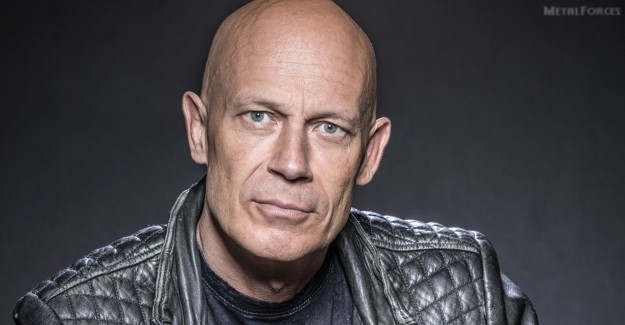
|
![]()
German metal group Accept embarked on an initial hiatus between 1997 and 2005, the interlude lasting roughly eight years until the veterans temporarily reunited for a summer festival run during 2005. A more permanent return would not unfold until four years later. September 1997 full-length studio album Classical marked guitarist Wolf Hoffmann’s inaugural solo foray, the affair consisting of metal interpretations of classical compositions from the likes of Tchaikovsky, among others.
“Many years ago, I had some off-time from Accept,” Wolf remembers. “I really wanted to make an album complete with the classical ideas I had sort of gathered over the years, and all of the classical themes I perhaps couldn’t do with Accept. I always wanted to do that; to combine classical and metal music. In Accept songs, there is only so much room. I thought that it would be fun to make a complete album with nothing but these instrumental tracks, where they don’t have to fit in any framework of an existing metal song. So, that’s what led to the first album many, many years ago, and I enjoyed it very much. Many people always came back to me year after year, and said ‘I love this album. I still listen to it. You should make a follow-up album.’ So, it’s been in the back of my mind for a long time to do another album.”
That second classically themed solo endeavour arrives in the form of July 2016’s Headbangers Symphony, although its initial inception was conceived some time ago. “It started around 2007 or 2008, and at that time Accept was not on anybody’s minds,” the axeman informs. “Nobody had any intention of regrouping. Accept was pretty much finished, because we didn’t have a singer. All of this stuff is pretty much well known, that Udo (Dirkschneider, former Accept vocalist) was no longer interested in working with us. I thought ‘Alright. If I can’t do Accept, what else is there that I would like to do?’ Then I thought of doing a follow-up to the classical album. I always wanted to do that, so I started working.
“I started to look around for a collaborator, because I knew I wanted to have it with strings and orchestra this time around. I started to look for somebody to work with to write all of those scores, because I can’t do that obviously. I couldn’t do it all alone. I finally found this guy from Italy – Melo Mafali. We started to work on the first demos around 2007 or 2008. Shortly after we did the first demos, we started getting everything into motion.
“Then Accept started to regroup, and we had to go on tour. We had to make albums, and then all of a sudden, there was no more time for anything but Accept. That’s why everything was dragged out for so many years. We literally only met every other year for a couple of weeks, and continued to work on it here and there. That’s not the right way to do it, but at least I figured that this was finally the time to finish everything and get it out on the market.”
Purchasing Classical via the market as it were, however – to backtrack – seems difficult. “I should talk to the label, and maybe see if we can do like a package deal for both of them together, or something like that,” Wolf muses. “That might actually happen, because you’re not the first person to complain that it’s so hard to find. I think you can get it on our website. Actually, there are still some copies left, but most people don’t even know to look there. I’ve heard that many times, yeah. It’s been out of print for so many years that the copies that are sometimes available are imports, and they’re expensive.”
Headbangers Symphony, to return to that central topic, includes the involvement of Melo Mafali. “He’s a classically trained pianist, composer and arranger,” the composer lists. “He knows all of that stuff, but at the same time, he has an understanding and a love of metal. He grew up listening to Deep Purple, just like I did, and all of the classic rock and metal bands. We speak the same language in that department as well; he is basically a classical guy with a love for metal and I’m a metal guy with a love for classical, and we can just sit there and work together. I can sing him something that I hear in my head, and he can make it happen. He can put it on tape and translate it into rock orchestra language. He knows what a viola will play versus a violin, for example. He knows all of that stuff and I don’t, so I needed somebody like that. That’s his role in the whole thing, though.”
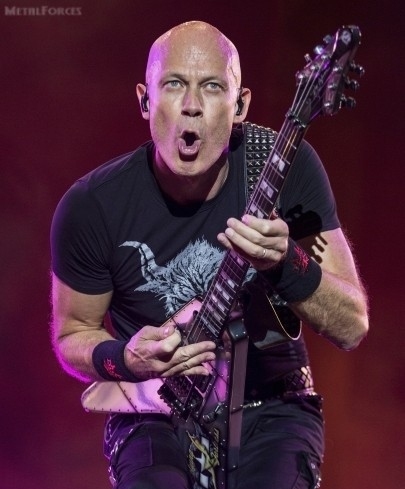
|
The pair originally met in Germany. “He actually approached me after I released my first classical album,” Wolf recalls. “He approached me, and said ‘I’d love to write some string arrangements for your next album, if you ever need some.’ I thought ‘Yeah, that sounds great, but I don’t really need anything right now,’ because the first album had already been released. I kept his address and tried to track him down all these years later though, and finally did. I’m glad.”
Armed with a classically trained arranger, the axe-slinger was tasked with selecting which tracks to adapt for inclusion on Headbangers Symphony. “Oh my God,” he ponders. “The field of classical music is so vast that you could never know it all, for sure. I just go about it like an average listener. I have classical music on in the background a lot of times, here in my house, and whenever there’s something that really moves me. I write it down, and I have a short list of pieces that I’d love to try. Then you just sit and try to play them on guitar, and see how well they translate. That’s pretty much the main criteria: ‘Is this piece even playable with electric guitar and with drums?’
“Some pieces are really hard or almost impossible to translate and play with a metal band, just because they weren’t written for that. They were written for orchestra, and have a different sense of timing and different sense of everything. Some pieces work really well, though. You just gotta figure out which ones they are, but the pieces that I chose were pretty much just all across the board and the spectrum. Just favourite tunes of mine that I admired and loved for a long time. Some of the stuff, like ‘Swan Lake’, is something that I wanted to do my whole life.”
Having admired and loved the genre for a number of years, Wolf was just generally exposed to classical music at a young age. “Just growing up, it was everywhere pretty much, but I’m not from a musical household,” he notes. “Nobody plays an instrument, or anything like that. Originally when I was a teenager though, I didn’t want to have anything to do with it. I just wanted to make metal, but for some reason, every time I heard classical music, I thought ‘There’s something there that touches me.’ The first guy that I really got into was Tchaikovsky. I thought ‘Man, that stuff is pretty dramatic and pretty metal in a weird way,’ so I started to buy more and more records. Then I really got into it for a while, and it never left me.”
A friend or family didn’t introduce the performer to the genre, per se. “Sometimes I just heard stuff on the radio,” he shares. “Like I said, growing up in Germany in those days, I think it was there all the time. I don’t know where, but it was on the radio. It was just around everywhere, even on TV and stuff, maybe more than today. I don’t actually know how I… It seems so remote now, because everything is about modern rock and the latest trends. Classical music really seems to be further in the back of people’s minds. It’s not as prominent now as it used to be. I don’t know, but it was around more (laughs). I was exposed to it.”
Classically themed elements seem more prevalent within the metal sphere in recent years, especially with the likes of symphonic metal rising in prominence. “Right,” Wolf seconds. “I’m not the first to discover this kind of stuff. Even back then, I noticed there were a bunch of bands and people trying to combine the two elements – Deep Purple was obviously one of them. There was a band in the Netherlands called Exseption that were somewhat popular in the 70s, and they did that extensively. There was Emerson, Lake And Palmer, who were really successful with some of that stuff. So, I’m totally not the first one to try this.
“Nowadays, there’s a lot of symphonic metal, like you said. I’m just trying to put my own personal spin on it, and do what I always wanted to do. In a weird way, this album is a very personal project of mine. I mean, it’s meant to be released to the public, but it’s really not written for anybody else. I didn’t really go about and study all of the other bands, and say ‘I’ve gotta do this for this or that target audience,’ blah blah blah. I honestly did it mostly for myself, the way I wanted to do it for all of these years. If people love it then I’m happy, but if they don’t then honestly I almost don’t care. It’s really a very ego project, if you want.”
If a musical concern isn’t personal in nature, then said musical concern isn’t arguably as exceptional in terms of its respective quality. “That’s what I was always hoping, and it’s how I approached the first album,” the musician reckons. “I honestly went about these things saying ‘I don’t care what anybody else thinks. I’m gonna do this because I love doing it. I wanna do it until I feel it’s the right way to do it.’ If people like it then great, but that’s usually the best way I believe to go about it. Deep in my heart, I kind of know when it’s right or when it’s wrong. If you think about somebody else, it’s tricky. You always go wrong I believe if you write stuff or release stuff with somebody in mind, with a certain target audience.”
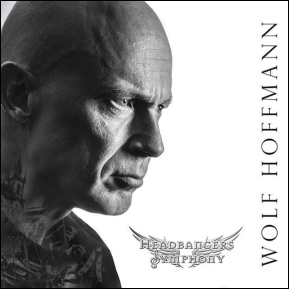
|
Classical music has influenced Accept’s material through the years. “Certainly in the solo parts and stuff, it always has been,” Wolf judges. “The way I play guitar, I think I have always been deeply influenced by classical themes and melodies. Even going back to albums like Restless And Wild (October 1982) and songs like ‘Fast As A Shark’, what I play on that song in particular – all the way back then – has definitely got some classical elements in it. It doesn’t really rip off any existing pieces, but it has that feel to it, and that melody could’ve been a classical piece. It never was, but it is definitely very heavily influenced by that, and that’s also in a song like ‘Metal Heart’ (from the March 1985 album of the same name). Obviously, there are many, many Accept songs where we can say ‘Oh, that sounds like a classical piece’.”
Had classical composers of times past been alive today, said composers would be rock stars in critical stature. “Of course, of course,” the axeman concurs. “I believe all of these composers that are still well known today, whether it’s Mozart or Beethoven or Tchaikovsky or whoever, they were sort of the Paul McCartneys and Princes of their time. They were the ones who broke the rules and became world famous, and they would be today. If those guys were alive today, they would write contemporary music. They probably wouldn’t write the music. They just use different tools, and they would probably use drum machines and who knows what else. Electric guitars and anything that’s out now, they would’ve used it. Back then, they used what they had available, which was classical orchestra music.”
As referenced by Wolf, difficulties exist with respect to translating classical music into a metal platform. “You’re always sort of looking for a main melody that’s easily recognisable,” he explains. “Some pieces are very elaborate; sometimes they have these 20-minute symphonies, or long, stretched out pieces. They don’t really have a melody that jumps out. It’s just beautiful music that sort of goes on and on, but you can’t pick out one melody that you can say ‘Oh, I can remember that, and I can even sing along to it.’
“The best pieces to transpose are the ones that have a very strong, recognisable main theme, like Beethoven… ‘Da da da… Da da da’ (hums the opening of ‘Symphony No. 5’), or… I don’t know… Mozart’s ‘Eine Kleine Nachtmusik’. Everybody knows those kinds of melodies, so the trick is to find the ones that are not too well known, but well enough and are actually playable on an electric guitar. If it’s just an orchestra with many voicings interlaced and you can’t pick out a certain strong melody, then it becomes really hard to translate that.”
Inevitably, certain classical pieces proved too difficult to transpose. “Oh, there was actually quite a few,” the songwriter highlights. “I have a whole list of things… I don’t even remember half of them. I know we worked on a bunch where we were like ‘No’, and a lot of times we just listened to them. We didn’t even try them that much. We just listened to them, and figured out that maybe they weren’t the right vibe and stuff. There were some Tchaikovsky pieces that I remember, and actually Mozart’s ‘Figaro’. We never quite figured that one out, but sometimes later, you come up with another part that actually makes it possible for it to work.
“It’s pretty much like writing a song; sometimes you have a snippet of a song idea and it never gets quite finished, but then a year later you come back and have the right idea for it, and it turns into a song. So, I wouldn’t really say that there are songs which are impossible to do. I would just say we didn’t find the right approach for some of these songs, so we just left them alone. Maybe we will attack them next time, if there’s ever a follow-up album.”
One track Wolf successfully attacked eventually didn’t surface on the final track listing for Headbangers Symphony. “A song (‘Dance Of The Nights’), which is a tragedy a little – it’s a little tragedy,” he describes. “It’s from Romeo And Juliet by Prokofiev, and it was all finished and recorded and mixed. At the very last minute, we hit a legal snag. We had to wait for permission to use that song, because the author or writer… Basically, he hasn’t been dead long enough (laughs). I think it takes 75 years for the rights to clear and become public domain, after somebody dies. I think in this case, we had to ask for permission from the family.
“The permission finally came, but it was too late at that point. We’re gonna release that as a bonus track somewhere, which is a shame, because it was one of my favourite tracks on the whole thing. We had to leave it off at the last minute, though. It’s one of those brutal decisions you have to make sometimes; you’ve gotta slaughter one of your kids basically, and let it go. It’s still gonna see the light of day eventually though, which is good.”
‘Dance Of The Nights’ features a guest bass appearance from Devin Townsend. “He did an amazing job,” the axe-slinger enthuses. “I was super-happy with the performance he did. He’s really an amazing player.”
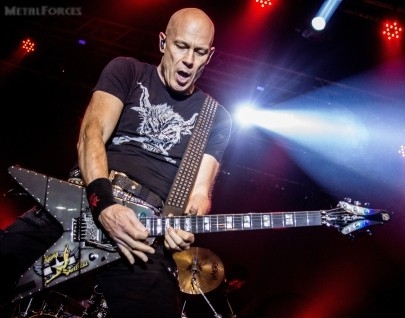
|
Additional performances Wolf happens to be enamoured with are that of the Czech National Symphony Orchestra, a full orchestra omitted from predecessor Classical. “I knew from the get go that I wanted there to be strings on the album,” he divulges. “Initially, we did what everybody’s doing. We went and used some sample libraries, where they’ve played on a piano and made it sound like an orchestra – like a violin, or a cello, or whatever. We did that initially and it sounded pretty good, but I wasn’t really happy with it.
“We replaced it with a better library, but eventually I got a hook-up with an orchestra in Prague and I went all the way. I wanted to do this properly; I wanted to do this right. We flew out there and had everybody play together in one big room; 40 people, a full-blown orchestra, performed the whole orchestration for us and recorded to the existing tracks. What you hear on the album is really played by human beings, and not by a computer.”
Each of Headbangers Symphony’s interpretations feature improvised guitar solos placed alongside. “That’s usually been my approach,” the entertainer critiques. “On a lot of these adaptations or pieces, I use the main theme and then come up with other parts that work well with it. Usually some metal riffs that I think work well, like in the case of ‘Night On Bald Mountain’, there’s a bunch of riffs that are of course not in the original piece. So, I write those riffs and then I solo over them, and that’s where the fun is. The fun for me is to write something that has a similar vibe to the original piece, but really just compliments, because that’s where my own person or own influence comes in. To me, it’s less fun to just play classical music. The most fun for me is to invent stuff that goes with the original piece, if you know what I mean.”
This is arguably where Wolf’s individual stamp enters the fray. “I believe so, yeah,” he agrees. “Absolutely, but I’m trying to be careful to not destroy the mood of the original piece. I’m quite liberal with what I do. I’m not really trying to represent the original composition; I take quite a lot of liberties and do whatever I feel is right, but at the same time, I’m mindful of matching the mood of the original. Say it’s a really slow and moody piece like ‘Air On The G String’; I would never in a million years turn that into a double-bass track, because that wouldn’t do the piece justice in any way. I’m trying to be mindful and come up with something that at least resembles the original thought and mood of the composition. I take a lot of liberties and do whatever the hell I would’ve done. I always said to myself ‘If I would’ve had that idea, what would have I done with it?’”
To promote Headbangers Symphony’s release, a music video was filmed for the track ‘Night On Bald Mountain’. “It’s a lot of fun,” the musician feels. “It’s epic, and quite impressive. We took the time to really have a full production with many cameras, so it’s a high quality video. It’s not just something on an iPhone. For now, it’s the only video. We might actually shoot another one, but it depends on how everything is going and how much time we have. We’ll have to wait and see. I haven’t even thought about it. All of my thoughts and all of my efforts have been concentrated on getting this one out on time, so I don’t even wanna know about a second one at this moment (laughs). There might be, though. You never know. If things go well and the whole world is screaming for more, we might do another one. Why not?”
Touring to promote Headbangers Symphony is being plotted. “That would be the best part of it all, if we managed to do that,” Wolf submits. “I don’t quite know yet how this is gonna happen, or when and where, but we’re definitely scheming on it. I’m talking with orchestras right now. we’re trying to get the logistics under control, so hopefully we can pull it off. I can’t quite promise yet, because it’s still in the works. As soon as you’re talking about orchestras and all these many players, it becomes very expensive and very complicated. That would be something that would be a lot of fun, but I want to do this right. I wouldn’t want to do it with just a handful of players. If it’s not done right, I wouldn’t want to do it. I would want all or nothing.”
Given the hefty expense of hiring an orchestra, such an undertaking might be restricted to festival appearances. “Exactly,” the axeman replies. “It might be a festival appearance, or something. I don’t think it’s ever gonna be a full-blown tour in the traditional sense where we go from Manchester to Cologne, Germany, and back and forth. That would be very, very tough to pull off, but there might be special appearances here and there.”
A third classically themed platter may come to fruition. “I can see it, possibly,” Wolf discloses. “I won’t let it take another 20 years. I might be too old by then (laughs), but I would definitely want to make another one if I get the chance. I would most likely do it in one go. I wouldn’t stretch it out over years; I would take a few months of my time and get it done, get it out, and record it with an orchestra all in one go. I would never try to do it in this layered approach, because it’s just painfully slow and it’s no fun. I would want to record it right away, which is really the best way to stay with the momentum. It’s really hard to make an album like this where you let it sit for a year or two, and then go back to it. It can take a lot of energy to force yourself to stay with it. It’s much more fun to stay in the moment, and do it in one go.”
To clarify however, a third classically themed jaunt isn’t in the works. In addition, the composer rules out cutting a more conventional metal solo album, where guest vocalists lend their services. “I will I tell you why,” he reasons. “My main gig is Accept, and I’ve been involved in this band for so many years that I really feel like this is all I can handle, man. All my songwriting energy and skills and everything goes into Accept, and I totally feel there’s nothing outside that I would have the energy or time for doing. I have no interest in making… If I wanted to do anything outside of Accept, it would be this classical stuff.”
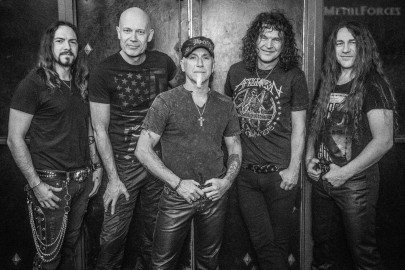
|
Having authored a weighty composition, Wolf’s natural inclination is to use said composition within the Accept camp. for Accept. “Yeah,” he confirms. “A lot of people have always asked me over the years ‘When Accept wasn’t existing, why didn’t you have your own band?’ I always say ‘If I had done that, it would have still sounded like Accept, and then everybody would have compared it to Accept.’ Everybody would have wanted me to play Accept songs live, so it would have been like a lesser version of Accept and it would have competed with the real deal. So, there’s really no need. Accept has been my band for 40 years, and I have no interest in doing anything outside of Accept that even competes remotely with the style of music that we’re doing. There’s really no sense in it. It would just dilute my energy, and dilute everything else that I’m doing.”
Black Sabbath guitarist Tony Iommi is arguably a great example, whose solo work musically resembles Sabbath but with someone else behind the microphone. “Yeah,” the axe-slinger responds. “I’ve seen it in other musicians many times, where it’s like the original band but it’s not as good. It competes, so why even go there? I have no need to. If I wanted to make albums, I’d make Accept albums.”
A follow-up to August 2014 Accept effort Blind Rage is in the works. “We are in the middle of it right now, actually,” Wolf reports. “I meet with Peter (Baltes, bass) all the time; we write songs and make demos all day long, all the time. When we have enough stuff, we call in the other guys. We’ll call Andy Sneap over, and we’ll go over everything, and start recording. It’s still not quite there yet, but you can’t rush this process. It’s not going quite as fast as it has been in the last couple of years, because we’ve been on tour all this time. We need a little bit of a break, but it’s getting there.”
A 2017 issue is being targeted. “That’s the goal; for it to be released in 2017, and to be recorded this year,” the performer updates.
Accept fanatics shouldn’t expect a deviation from previous works, per se. “It’s too soon, but our goal is to not make it be any different,” Wolf expresses. “We want it to be exactly like the last three albums, only better. That’s our goal. We don’t really want to change anything. We don’t really want to have a change of style; we don’t want it to be harder, or softer, or faster, or slower, or nothing. It’s just right in your face, Accept-styled metal riffs like we’ve always been doing, and as good as it can possibly be. The first songs we’ve written are really amazing. I’m feeling pretty damn good about what we have so far – we just need more.”
Guitarist Uwe Lulis and drummer Christopher Williams, whose additions were confirmed on April 12th, 2015, will make their Accept studio debuts on the forthcoming opus. “That’s another thing that’s gonna contribute,” the musician observes. “Now that we have two great players – new guys in the band – they’re definitely gonna help the process, for sure.”
Headbangers Symphony was released on July 1st, 2016 via Nuclear Blast.
Interview published in July 2016.
Related Posts via Categories
- SCOTTISH SICKNESS – A Report On The Scottish Death Metal Scene, Featuring BRAINBATH, PUTRID FATE And RANCID CADAVER (October 2022) | Features / Interviews @ Metal Forces
- LARVAE – Join The Hardcore Cult! (June 2022) | Features / Interviews @ Metal Forces Magazine
- TRENCH FOOT – Sacrificing Morals For Gory Obscenities (June 2022) | Features / Interviews @ Metal Forces Magazine
- L.A. GUNS – Trigger Happy (March 2019) | Features / Interviews @ Metal Forces Magazine
- CANCER – Crimes So Evil (November 2018) | Features / Interviews @ Metal Forces Magazine
- U.D.O. – The Tank Drives On (August 2018) | Features / Interviews @ Metal Forces Magazine
- SIEGE OF POWER – Bleeding For The Cause (August 2018) | Features / Interviews @ Metal Forces Magazine
- MOONSPELL – A Taste Of Live Eternity (August 2018) | Features / Interviews @ Metal Forces Magazine
- MONSTROSITY – Dark Matter Invocation (August 2018) | Features / Interviews @ Metal Forces Magazine
- SATAN – Five Magicians (August 2018) | Features / Interviews @ Metal Forces Magazine
|
|





